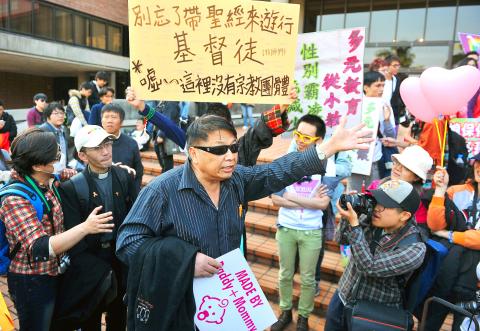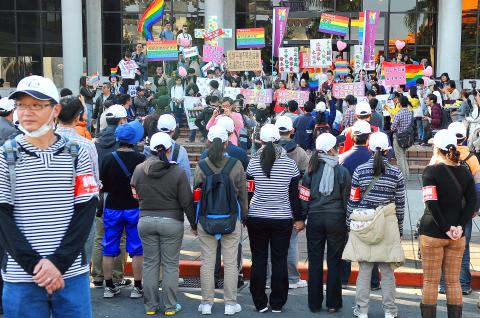Holding up signs that read “Against Civil Code 972 Amendment,” “Safeguard Family” and “Stop Sexual Liberation,” tens of thousands marched down Ketagalan Boulevard on Nov. 30 last year in an effort to pressure the government to halt legislation that would allow same-sex unions. Politicians, including Control Yuan President Wang Chien-shien and Chinese Nationalist Party (KMT) legislators Lai Shyh-bao (賴士葆) and Ting Shou-chung (丁守中), gave speeches to show their support. Ting currently serves as vice president of Buddha’s Light International Association, R.O.C. (國際佛光會中華總會); Wang and Lai are Christians with ties to the Bread of Life Christian Church (靈糧堂).
Though Christians, particularly the Presbyterian Church, are renowned for their support of human rights — particularly democracy and activism against the Chinese Nationalist Party’s (KMT) authoritarian regime during the Martial Law era — over the past decade they have formed strategic coalitions to wage anti-gay campaigns to influence government policy.
CHURCH AND STATE

Photo: Chien jung-fong, Taipei Times
Pastor Chen Chih-hung (陳志宏), a Taiwan Lutheran Church (基督教台灣信義會) bishop, points to a network of religious groups that include the Bread of Life Christian Church, Taipei Truth Lutheran Church (台北真理堂), Top Church (新店行道會), which belongs to the Covenant Church, and Chi Ming (齊明), a researcher from the Human Life Ethics Center at the Fu Jen Faculty of Theology of St. Robert Bellarmine.
Before last year’s protest, the most notable anti-gay mobilization occurred in 2011 when the Chen Ai Alliance (真愛聯盟), a self-proclaimed parents group of which Chi was the spokesman, successfully pressed the Ministry of Education (MOE) to suspend the release of three reference books that contain gender and sexual diversity teaching materials, as required by the Gender Equity Education Act (性別平等教育法), for teachers in elementary and junior high schools, with help from several legislators.
In a 2007 interview published in the Bread of Life Literature Collection (靈糧文薈), Chi called for Christians to fight against lesbian, gay, bisexual, and transgender (LGBT) rights legislation through political means. He also spoke of having lawmakers work to support their cause as well as blocking the gay marriage bill by a Christian coalition he led a year before.

Photo: Chien jung-fong, Taipei Times
In 2006, Democratic Progressive Party (DPP) Legislator Hsiao Bi-khim (蕭美琴) proposed a draft same-sex marriage law (同性婚姻法). The bill was later blocked by a group of lawmakers led by Lai and then DPP legislator Wang Shih-hsun (王世勛).
Religious conservatives make little secret of their easy access to politicians. Lai, for example, arranged a meeting between Premier Jiang Yi-huah (江宜樺) and a dozen religious groups, including the Alliance of Religious Groups for the Love of Families Taiwan, Fu Jen Faculty of Theology of St. Robert Bellarmine, Taiwan Theological College and Seminary and the Buddhist Association of the Republic of China (中國佛教會), in November of last year. With Minister of Justice Luo Ying-shay (羅瑩雪) and Vice Minister of Education Chen Te-hua (陳德華) also reportedly present at the meeting, the participants demanded to have religious and parent representatives at the MOE’s Gender Equity Education Committee, which is responsible for developing and promoting policies and regulations regarding gender equality in education.
A few months later, the MOE made controversial appointments of three anti-LGBT advocates and academics — Tseng Pin-chieh (曾品傑), Ting Hsueh-yin (丁雪茵) and Yan Han-wen (晏涵文) — as new members of the abovementioned committee.
DPP Legislator Cheng Li-chun (鄭麗君) says the fact that organized religion exerts significant influence on policy-making decisions is a cause for great concern.
“Some lawmakers hold posts in religious groups and tend to represent their interests. But a lawmaker needs to separate the job from his or her faith. Otherwise each religion can have its representatives inside the legislature … Even if lawmakers are opposed to same-sex marriage, they should discuss the issue from the legal and human rights perspective,” she says.
LOBBYING POLITICIANS
Religious organizations have managed to lobby the legislature and set their own political agenda. Lawmaker Cheng points out that every individual or institution is entitled to political advocacy, but the way lobbying is conducted should never involve any form of discrimination or disregard for human rights.
“The opponents of same-sex marriage use false information to defame and fearmonger … They adopt discriminatory language aiming to attack, calling homosexuality a disease at public hearings [on the same-sex union legislation] … If Taiwan had an anti-discrimination law, they would go to jail for what they say,” the legislator says.
Putting pressure on lawmakers is another way of lobbying adopted by anti-LGBT advocates. Cheng, who introduced the amendments to Article 972 of the Civil Code to the legislature last October, has been subjected to crank calls and malicious online propaganda accusing her of destroying families.
A supporter of the amendment, DPP legislator Yu Mei-nu (尤美女) says her office has been bombarded with phone calls by angry citizens who “scold and scream from day to night.”
“It is no use trying to reason with them … People even dash into legislators’ service offices, threatening not to vote for the DPP again,” Yu says.
Religious authorities also deploy representatives to meet with high-ranking politicians such as Legislative Speaker Wang Jin-pyng (王金平) and former DPP Chairman Su Tseng-chang (蘇貞昌) to express their opposition to same-sex marriage.
Consequently, most lawmakers find the bill a political hot potato and choose to stay away from it, Yu and Cheng say.
“When everyone at the legislature avoids taking a stand on the issue, then you get no discussion or debate. When people choose not to see it, the bill is dead,” Yu adds.
At present, the proposed amendments have been referred to the legislature’s Judiciary and Organic Laws and Statutes Committee for further discussion. However, KMT legislators Liao Cheng-ching (廖正井) and Lu Hsueh-chang (呂學樟) — the current co-chairs of the committee — have yet to schedule meetings to review the amendments and, as Yu observes, have no intention of doing so.
GAINING UNDERSTANDING
Both Yu and Cheng say that more communication and dialogue are needed for the public to gain empathy and to understand the difficulties faced by the LGBT community.
Victoria Hsu (許秀雯), chief executive officer of the Taiwan Alliance to Promote Civil Partnership Rights, agrees. She says that the group has been preparing to file lawsuits against government agencies to challenge laws that discriminate against individuals based on their sexual orientation.
The cases will show the various forms of discrimination same-sex couples are subject to by not having marriage rights. For example, when a Taiwanese gay man and his Canadian partner tie the knot in Canada, where same-sex marriage is legal, and return to Taiwan, their union will pose challenges to the country’s existing immigration laws. The fact that same-sex couples cannot protect common property is also a source of anxiety.
“Legislation is a form of advocacy and relies heavily on party politics. Bringing cases to court, on the other hand, will shed light on each individual’s life story so that society can understand that by not allowing same-sex marriage, the LGBT community are not only deprived of the right to marry but the tens of thousands of legal rights and obligations that go with marriage,” Hsu says.
Veteran gay-rights activist Chi Chia-wei (祁家威) has spent over a decade trying to change the legal system to reflect Taiwan’s contemporary reality. Between 1998 and 2000, he launched multiple legal bids to seek recognition of his marriage; all were rejected. Last year, Chi again filed a complaint against a government agency that refused to register his marriage. The Taipei High Administrative Court threw out the appeal earlier this year, saying it did not violate the law that stipulates that “a marriage contract should be between a man and a woman.”
Chi has filed an appeal to the Supreme Administrative Court.
“They can’t threaten me. I don’t have a family [to protect]. I am not afraid of anyone,” Chi says.
Meanwhile, the country’s gay Christians have suffered a serious blow. Last month, the Presbyterian Church adopted and confirmed a pastoral letter issued by the church’s general assembly, which announced that the church would officially oppose same-sex marriage.
The letter came as a result of a motion jointly made by pastors representing the Presbyterian churches in Great Kaohsiung and Greater Tainan, says Chen Hsiao-en (陳小恩), secretary of the Tong-Kwang Light House Presbyterian Church (同光同志長老教會).
Chen says the letter stands for the church’s official position on same-sex marriage, and the impact is expected to be huge.
“Each pastor is now expected to cure gay and lesbian believers in accordance with the position taken in the letter. Or if a gay person wishes to be baptized, he or she will have to repent and promise not to engage in homosexual conduct,” she says.
“Every human rights activist in Taiwan knows that today the biggest opposition to same-sex marriage is Christianity. Before we at least had the Presbyterian Church, which was regarded as gay-friendly, and many of its pastors have been supportive and open-minded when it comes to lesbian and gay issues. That’s all changed.”
The impact of the letter has already been felt, and Chen Hsiao-en is among the first ones to suffer.
On the same day when the church’s general assembly issued the letter, Chen Hsiao-en was taking an oral examination for admission to the Tainan Theological College and Seminary. She was immediately told that as the motion was passed hours earlier, the school could not admit her on the grounds of her sexual orientation.
“They decided to refund my registration fee as if I never came,” Chen Hsiao-en says.

That US assistance was a model for Taiwan’s spectacular development success was early recognized by policymakers and analysts. In a report to the US Congress for the fiscal year 1962, former President John F. Kennedy noted Taiwan’s “rapid economic growth,” was “producing a substantial net gain in living.” Kennedy had a stake in Taiwan’s achievements and the US’ official development assistance (ODA) in general: In September 1961, his entreaty to make the 1960s a “decade of development,” and an accompanying proposal for dedicated legislation to this end, had been formalized by congressional passage of the Foreign Assistance Act. Two

Despite the intense sunshine, we were hardly breaking a sweat as we cruised along the flat, dedicated bike lane, well protected from the heat by a canopy of trees. The electric assist on the bikes likely made a difference, too. Far removed from the bustle and noise of the Taichung traffic, we admired the serene rural scenery, making our way over rivers, alongside rice paddies and through pear orchards. Our route for the day covered two bike paths that connect in Fengyuan District (豐原) and are best done together. The Hou-Feng Bike Path (后豐鐵馬道) runs southward from Houli District (后里) while the

March 31 to April 6 On May 13, 1950, National Taiwan University Hospital otolaryngologist Su You-peng (蘇友鵬) was summoned to the director’s office. He thought someone had complained about him practicing the violin at night, but when he entered the room, he knew something was terribly wrong. He saw several burly men who appeared to be government secret agents, and three other resident doctors: internist Hsu Chiang (許強), dermatologist Hu Pao-chen (胡寶珍) and ophthalmologist Hu Hsin-lin (胡鑫麟). They were handcuffed, herded onto two jeeps and taken to the Secrecy Bureau (保密局) for questioning. Su was still in his doctor’s robes at

Mirror mirror on the wall, what’s the fairest Disney live-action remake of them all? Wait, mirror. Hold on a second. Maybe choosing from the likes of Alice in Wonderland (2010), Mulan (2020) and The Lion King (2019) isn’t such a good idea. Mirror, on second thought, what’s on Netflix? Even the most devoted fans would have to acknowledge that these have not been the most illustrious illustrations of Disney magic. At their best (Pete’s Dragon? Cinderella?) they breathe life into old classics that could use a little updating. At their worst, well, blue Will Smith. Given the rapacious rate of remakes in modern